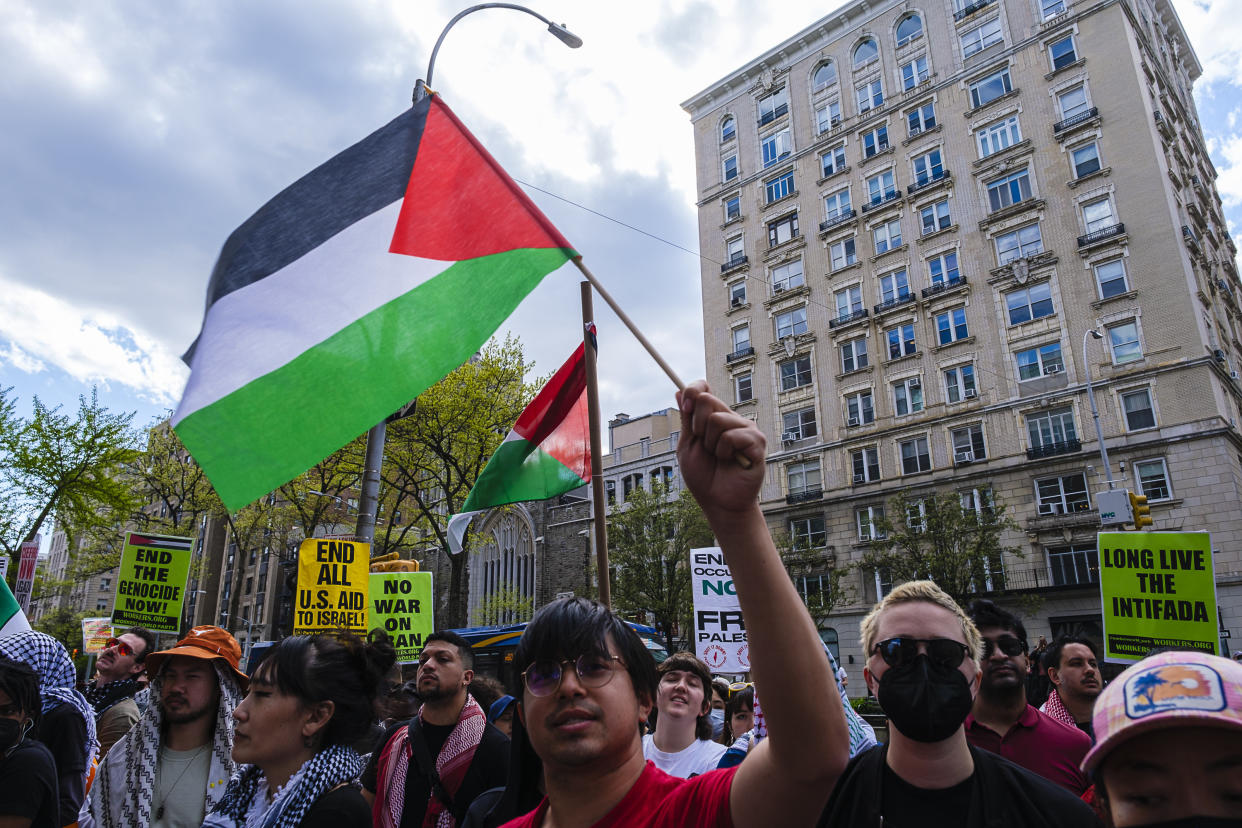University over Gaza protests, school goes remote, Gov. Hochul visits campus

NEW YORK — Columbia University, on edge amid growing concern about safety and antisemitic rhetoric on a campus rocked by protests and encampments, made all classes remote Monday, the first night of Passover.
University President Minouche Shafik announced overnight that the goal is to “deescalate the rancor and give us all a chance to consider next steps.”
“Faculty and staff who can work remotely should do so; essential personnel should report to work according to university policy,” the president said in a statement. “Our preference is that students who do not live on campus will not come to campus.”
Columbia had previously said remote learning would be an option for students who requested accommodations, before changing course and going all-remote for Monday.
“Let’s sit down and talk and argue and find ways to compromise on solutions,” Shafik said, announcing a new working group of deans, administrators and faculty to “try to bring this crisis to a resolution,” and meet with student protesters.
“I know that there is much debate about whether or not we should use the police on campus, and I am happy to engage in those discussions,” said Shafik, who added that better adherence to university policies would make a NYPD presence unnecessary.
The announcement comes four days after the NYPD, at the university’s request, cleared the encampments on the south lawn and took more than 100 students into custody. All but a handful were issued summonses for trespassing.
The encampment returned on Sunday, just yards away from the site of the original tents, after protesters for three nights had been sleeping on the grass without any sort of shelter.
Hochul: Many students not feeling safe
Gov. Hochul on Monday met with city and university officials and Columbia students to discuss balancing public safety with people’s right to peacefully assemble and have freedom of speech.
“My number one job is to keep people in this state safe,” Hochul said after the meetings. “And right now, there are many students not feeling safe on campus.”
“I was once a student protester. I protested institutions, I protested governments, I protested against apartheid. But I’ve never seen a level of protest that is so person-to-person, and is so visceral, and I’m now calling on everyone: People need to find their humanity. Have the conversations, talk to each other, understand different points of view — because that’s what college students should be doing.”
University officials condemned the return of the campus encampment.
“Students do not have permission to set up tents on the lawn,” a university spokesperson said in a statement. “Those who do are in violation of long-standing University policy and will be identified and subjected to disciplinary action.”
Columbia has more than doubled the number of guards and supervisors per shift and added private security personnel along the perimeter of campus, university officials announced.
Passover escorts
For students who choose to remain on campus, Columbia is providing escorts to walk students to and from Passover seder and services, according to a memo from the campus Hillel. NYPD will be at the Jewish student life center throughout the eight-day holiday, they said.
“It is unacceptable that I need to send this email in 2024,” Brian Cohen, the Lavine Family executive director of Hillel, wrote to students. “The University continues to fail to enforce its rules, despite escalating antisemitic harassment and around-the-clock protest activity on and around campus.”
While no students have reported incidents of physical harm to the NYPD, there have been reports of flags being taken and hateful rhetoric, cops said Monday at a press conference outside the campus gates.
“We have received reports that Israeli students were walking on campus, had their flags taken away from them, snatched out of their hands,” NYPD Deputy Commissioner Kaz Daughtry said. “We also received reports that the Israel students, there was some hateful things that was said towards them.”
Columbia University Apartheid Divest, a coalition of more than 100 student groups that organized the tent demonstration, slammed characterizations of their protest as antisemitic or menacing.
“We are frustrated by media distractions focusing on inflammatory individuals who do not represent us,” the statement said.
“We have been peaceful,” it continued. “We will remain until moved by force or Columbia concedes to our demands,” including to divest from Israel, and reverse all student and faculty discipline measures related to pro-Palestinian activism.
The latest chapter in the ongoing tension over Gaza at Columbia began last week as Shafik readied for a congressional hearing on the university’s response to antisemitism. On campus Wednesday, students began occupying a lawn with dozens of tents, which they called the “Gaza Solidarity Encampment.”
University administrators warned students to leave and began notifying them Thursday of suspensions. By the afternoon, Shafik called the NYPD in riot gear to clear the lawn.
But the sweep only emboldened the demonstrators who continued to camp out on the lawn, while they chanted, hosted lectures, danced and held screenings throughout the weekend. Four progressive councilmembers joined students, while protesters along the perimeter of campus continued to show support for their cause.
While some Jewish students participated in the demonstration, others reported feeling uneasy both in and around campus. The university rabbi warned Jewish students to stay home, and more than 100 of them signed onto an open letter asking to attend classes online “until the situation has entirely de-escalated.”
In recent days, student protesters on other college campuses, including New York University and The New School, have erected anti-war encampments of their own to back the Columbia students and call for divestment from Israel.


